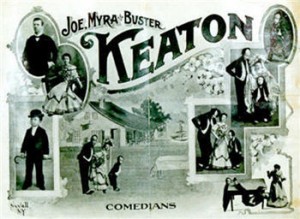 “Vaudeville: light entertainment…that consisted of 10 to 15 unrelated acts, featuring magicians acrobats, comedians, trained animals, jugglers, singers and dancers.”[1]
“Vaudeville: light entertainment…that consisted of 10 to 15 unrelated acts, featuring magicians acrobats, comedians, trained animals, jugglers, singers and dancers.”[1]
Peter Kramer, in his piece A Slapstick Comedian at the Crossroads, traces comedy star Buster Keaton’s beginnings in vaudeville to his breakthrough into cinema. Aside from providing the reader this information, Kramer touches on the perceptions critics, audiences and performers had of the theater, vaudeville and cinema.
Keaton was born into the entertainment industry and had already acquired fame as a child vaudeville star. His father, a falling star himself, had despised the cinema. His reasoning was that the cinema took away from the audience’s enjoyment, which was rooted in the perfection of the performance. If the Keaton routine were placed on filmstrip, the mass production would take away from their unique performance and connection with the audience (Kramer: 137).
Evidently for artists, vaudeville required more skill than legitimate up market entertainment, or the theatrical musical comedy. Legitimate artists worked with scripts, stage managers, and other staff in order to complete their production, while the vaudeville star played all these parts and more himself (136).
Although Keaton was encouraged to “go legitimate,” he held off due to his father. His contemporary had stated that he found a legitimate audience to be easier to please, and more willing to wait for the laughs while vaudeville viewers sought immediate gratification.
So now we must question why the terminology “legitimate” is used to describe theater, while vaudeville, although revered, was not considered its equal. This could be in part to the fact that the musical comedy was larger, more stabilized and catered to a wealthier audience. Despite this, there was a sort of “body poetry” associated with vaudeville (141). Cinema, because of the mass reproduction inherent in its nature furthered it from comedy’s free rhythmic nature found present in vaudeville.
[1] http://www.britannica.com/EBchecked/topic/624129/vaudeville